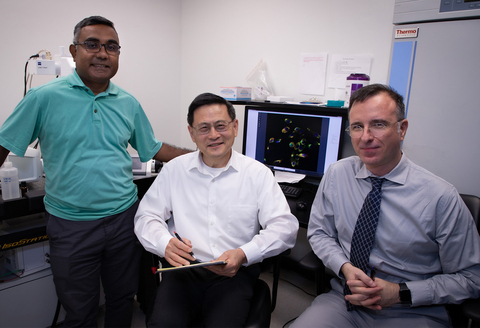The study, published in the Journal of Clinical Investigation, hopes to lead to new sepsis therapies
Sepsis is one of the leading causes of in-hospital deaths worldwide and is often known as a silent killer. Despite claiming the lives of more than 11 million people globally each year, there is no one treatment. In a potential therapeutic breakthrough, investigators at The Feinstein Institutes for Medical Research have identified a type of white blood cell that can worsen inflammation in sepsis and opens up new avenues of research to treat the deadly condition.
This press release features multimedia. View the full release here: https://www.businesswire.com/news/home/20230721453105/en/

Drs. Monowar Aziz, Ping Wang and Max Brenner recently published the study in the Journal of Clinical Investigation. (Credit: Feinstein Institutes)
Results of the study, led by Ping Wang, MD, professor and chief scientific officer at the Feinstein Institutes, were published today in the Journal of Clinical Investigation. The paper outlines how Dr. Wang and his colleagues, Monowar Aziz, PhD, and Max Brenner, MD, PhD, discovered a new subset of neutrophils – which are typically regarded as the first line of immune defense against infection as one of the main cell types involved in the initiation of the inflammatory response – called antigen-presenting aged neutrophils (APANs). These specific neutrophils proved to be extremely inflammatory. Upon activation, APANs can cause severe tissue damage.
“APANs, when triggered, can result in devastating circumstances for patients who have sepsis,” said Dr. Wang, senior author of the paper. “The discovery of these neutrophils will help researchers and doctors to better understand sepsis and develop new therapies to tackle this condition.”
Sepsis occurs when the body’s immune system triggers inflammation to help fight against infection. If out of control, this inflammatory response can cause damage to multiple organ systems and often leads to death. Patients with sepsis often exhibit the simultaneous occurrence of pro- and anti-inflammatory pathways, which can lead them to suffer from immunosuppression, the inability to eradicate invading bacteria and eventually become susceptible to secondary infections.
This paper builds off Dr. Wang’s previous research which showed that extracellular cold-inducible RNA-binding protein (eCIRP) is a new inflammatory mediator. eCIRPs are an alarm molecule released during sepsis that could cause immune dysfunction. They also disrupt the cells within the immune system, which ingest bacteria and secrete both pro-inflammatory and antimicrobial mediators, known as macrophages.
In this new research, the frequency of APANs was significantly increased in the blood, spleen and lungs in septic mouse models, as well as in the blood of sepsis patients. APAN-transferred septic mice had increased levels of injury and inflammatory markers, exacerbated acute lung injury and eventually lowered survival odds, concluding that eCIRPs released during sepsis induced APANs that could potentially be harmful.
Last year, Dr. Wang and co-principal investigators at the Feinstein Institutes received $3.8 million from the National Institute of Health to study sepsis and radiation exposure.
About the Feinstein Institutes
The Feinstein Institutes for Medical Research is the home of the research institutes of Northwell Health, the largest health care provider and private employer in New York State. Encompassing 50 research labs, 3,000 clinical research studies and 5,000 researchers and staff, the Feinstein Institutes raises the standard of medical innovation through its five institutes of behavioral science, bioelectronic medicine, cancer, health system science, and molecular medicine. We make breakthroughs in genetics, oncology, brain research, mental health, autoimmunity, and are the global scientific leader in bioelectronic medicine – a new field of science that has the potential to revolutionize medicine. For more information about how we produce knowledge to cure disease, visit http://feinstein.northwell.edu and follow us on LinkedIn.
View source version on businesswire.com: https://www.businesswire.com/news/home/20230721453105/en/
Contacts
Julianne Mosher Allen
516-880-4824
jmosherallen@northwell.edu
